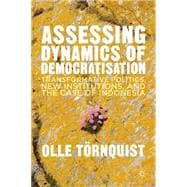Assessing the Dynamics of Democratization grows out of attempts by academics and activists to contribute to transformative politics by building up more and better evidence, and analysing the processes of democratisation in a way that is theoretically more inclusive than in the mainstream assessments that have come to parallel the industry of measuring economic growth. The book summarises the critique of these mainstream assessments, proposes an alternative framework, and shows how the alternative works through a case study of the largest of the new democracies, Indonesia. It is a book for critical scholars, students and practitioners.








